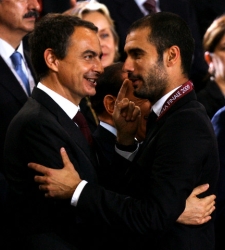
Draining the legislature. That has been the gospel that Moncloa has managed to deliver to the ministers and PSOE officials. A strategy that has a clear goal of extending a message of calmness to the markets and continuity in the reforms to settle the economical recovery.
That was the main objective of the president's speech on the sad election night on Sunday, as unexpected as jose Blanco's appearance before the federal executive. Both acts aim to cease the voracity of the financial markets that gloat over the government's weakness.
On the margin of messages and slogans, there is a general conscious in Moncloa and Ferraz that the government's continuity will, inevitable, depend on the popular party. Mariano Rajoy's followers that now control the territorial power and the favors of the factual economic powers, as well as the political opportunists. This is why they will seek an agreement with the powers to ensure the reforms.
The socialist ranks still contemplate the possibility of Rodriguez Zapatero himself convening the opposition leader to ask him for, if not support, at least abstention to be able to culminate the pending reforms, which will initially focus on: finishing the financial system reform; passing a reform on the collective negotiation in case there is not an agreement between the social agents; modify the labor reform; close the retirement reform and take on new releases on the services that would affect commercial schedules, distribution contracts and professional services.
"It is not about a formal pact, but a non-aggresion pact that allows the approval of some nesscesary measurements and reassure the markets," explain some PSOE's leaders.
Fall appointment
If the popular party was to accept, as it hardly is (see page 11) Zapatero wuld have access to call for elections in the fall. The end of September or beginning of October are the expected deadlines. This date has been perfectly planened. September 30 is the deadline for the gobernment to present in congress the Law of General State Budget for 2012. A series of budgets that must be austere and that could contemplate new adjustments in public salaries and pensions. The electoral process would force the current budgets, giving the incoming gobernment a year to straighten up its budget.
Moreover, within the party, the PSOE would have enough time to hold primaries and have a solid candidate with the general support of the party. Also, from an image's perspective, Zapatero "could always argument legislative is over after the summer and the reform's goals have been reached."
Oustanding socialist barons have started tu shuffle the hipotesys of early elections , mostly in private although some have made public statments, such is the case for Extremadura's president Guillermo Fernandez vera, who has made it clear that "If I was on his shoes (refering to Zapatero) I would consider early elections."
The other scenario being contemplated in Moncloa and Ferraz is to hold until March with specific support from Basque and Canarian nacionalists. "The PNV will not abandon Zapatero, we will pay Bildu's toll," they assure. In the executive they are also aware that it iwll be "really hard" to hold the "internal pressures" for that long.